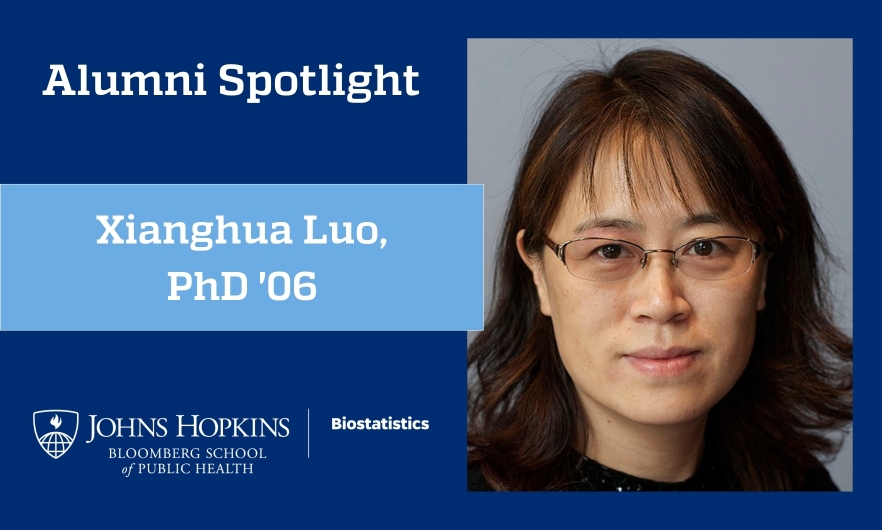Xianghua Luo, PhD '06
Xianghua Luo, PhD '06, works as a statistical consultant for cancer-related projects and collaborate with researchers at the University of Minnesota Masonic Cancer Center.

Xianghua Luo, PhD '06, is currently a non-tenure track assistant professor, Division of Biostatistics, School of Public Health, University of Minnesota. Her thesis, under the direction of Mei-Cheng Wang was entitled “Recurrent Event Models with Time-Dependent Covariates and Informative Censoring.”
Xianghua works as a statistical consultant for cancer-related projects and collaborate with researchers at the University of Minnesota Masonic Cancer Center. She also teaches a longitudinal data course to PhD students in the Biostatistics Division. So far, she has more than 36 publications in various medical fields, including blood and bone marrow transplantation, smoking and basic cancer research.
How did you get interested in the field of biostatistics? What was your background before enrolling at Hopkins?
I became familiar with the field of biostatistics from alumni at Peking University (PKU). Their success stories motivated me to apply for graduate study in biostatistics. From them, I learned that anyone who was confident in his or her quantitative skills and interested in using those skills to help people would be well-suited for a career in biostatistics. You don't need to be a math/stat major to apply to biostatistics programs! In my case, I was an urban and environmental sciences (read "geography") major at PKU. After taking the first couple of years of geography courses, I became disappointed with the major. I felt that it was too "soft" and needed something more rigorous and challenging. So I took as many quantitative courses as I could and wrote a thesis on the statistical analysis of some geographical data. I knew that geography was not a field I wanted to pursue. After a few geography students were accepted into biostatistics programs, I realized that that was the field that I wanted to try.
Describe your current position and responsibilities in a way that will inform prospective students about career opportunities in biostatistics.
My current position is non-tenure track Assistant Professor, Division of Biostatistics, School of Public Health, University of Minnesota. I work as a statistical consultant for cancer related projects and collaborate with researchers in University of Minnesota Masonic Cancer Center. I also teach the longitudinal course to phd students in the Biostat Division.
How did Johns Hopkins Biostatistics prepare you for your career? What aspects of the program did you find most useful?
I mostly appreciate the teaching and research opportunities that I had from both the Biostatistics Department and other departments at the Johns Hopkins Medical Institutions. These experiences did not just make my CV longer - I actually learned a lot from these experiences. I also appreciate the mentoring that I received from my advisor, Dr. Wang, and other faculty in the department.
What are your favorite memories of your time at Johns Hopkins Biostatistics?
Sitting in Dr. Wang's office and discussing my thesis.
Is there any other information about your experience at Hopkins that would be useful for prospective students?
If I had it all to do over again, I would use my time more smartly and try to work with multiple faculty members on different statistical problems.
